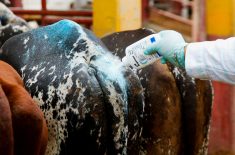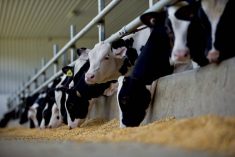A farmed herd of elk in western Saskatchewan is scheduled to be destroyed after one of the elk tested positive for chronic wasting disease, CBC reported Friday.
The Canadian Food Inspection Agency recently confirmed an elk that died last month on the hunt farm and breeding ranch near North Battleford had tested positive for CWD, CBC said.
“Canada has an eradication policy for CWD, and unfortunately there’s currently no reliable live-animal test for chronic wasting disease in elk,” CFIA veterinarian Dr. Connie Argue told the broadcaster Friday.
Read Also

Mexico agriculture secretary says still no date for restarting cattle exports to U.S.
Mexican Agriculture Minister Julio Berdegue said on Wednesday that Mexico and the United States have not yet set a date to resume Mexican cattle exports amid an outbreak of the flesh-eating screwworm parasite.
“We know the disease is transmitted directly by animal to animal contact. And so the only way to ensure the disease doesn’t spread further is to destroy all the animals that have been in contact with a positive case.”
Argue said the entire herd will be destroyed before the end of April, and testing would be done on animals from other farms to see if any other animals had been exposed to the disease.
CWD, a transmissible spongiform encephalopathy (TSE) such as BSE in cattle, scrapie in sheep and Creutzfeldt-Jakob disease in humans, has been a reportable disease in Canada since 2001. It’s not known exactly how lateral transmissions (animal to animal) of CWD occur.
The North Battleford herd was placed under quarantine last week. Owners of animals ordered destroyed after a CWD finding get compensation under the federal Health of Animals Act.
CBC said this marks the second case of CWD on a Saskatchewan farm this year, on top of four cases reported in 2008.











